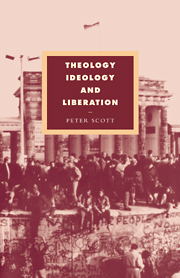Book contents
- Frontmatter
- Contents
- General editors' preface
- Preface
- Introduction
- PART I THE SHAPE OF THE ARGUMENT
- PART II LIBERATING THEOLOGY
- PART III CHRISTIAN LIBERATION?
- 5 Theology and society
- 6 Incarnation, resurrection and liberation
- 7 Society and God's trinitarian presence
- 8 Unfinished business
- References
- Index
- ADVERTISEMENT
7 - Society and God's trinitarian presence
Published online by Cambridge University Press: 05 December 2011
- Frontmatter
- Contents
- General editors' preface
- Preface
- Introduction
- PART I THE SHAPE OF THE ARGUMENT
- PART II LIBERATING THEOLOGY
- PART III CHRISTIAN LIBERATION?
- 5 Theology and society
- 6 Incarnation, resurrection and liberation
- 7 Society and God's trinitarian presence
- 8 Unfinished business
- References
- Index
- ADVERTISEMENT
Summary
INTRODUCTION
In the previous chapter I argued that resurrection refers to a reconstitution in the sociality of human being. As such, it insists on a radical conception of revolution: death is not the boundary of social being. This offers a new horizon for Christian thinking about liberation. In the reconstitution of embodiment as social, social matters are taken up into the eschatological horizon of resurrection. Such an horizon may be understood as the nerve of Christian practice.
Yet, how is this a feature of an oppositional theology? How does this allow the determination of theology as neither too close nor too distant? Resurrection as the transformation of a limit of sociality restores human being to its character as social being. It thereby insists that praxes of emancipation are not to be interpreted as bounded by death. Work, embodiment and language of course have their social horizon: they are all relations of production. Now, embodiment has its social, yet also eschatological, horizon. In this way, work and language are thereby reconstituted, in the attempt to render intelligible such a revolution in embodiment. The attempt to reconstruct work and language in a particular society is also to be understood as placed within this eschatological horizon. Christians may work for the surpassment of the present in that it has already, as embodied, been affirmed and surpassed in the resurrection of a body.
- Type
- Chapter
- Information
- Theology, Ideology and Liberation , pp. 209 - 233Publisher: Cambridge University PressPrint publication year: 1994



